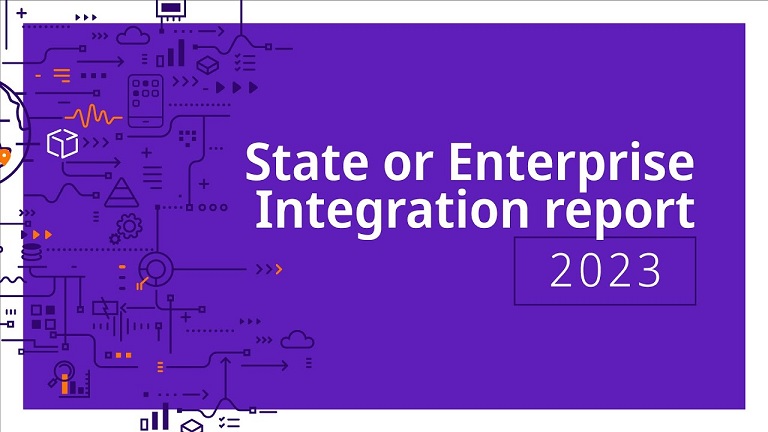Amazon Web Services (AWS) announced the general availability of Amazon Q, a generative artificial intelligence (AI)-powered assistant for accelerating software development and leveraging companies’ internal data.
An ever-widening gap exists between those organizations already leveraging iPaaS and those that are lagging due to a reliance on outdated integration technology, e.g., in-house, on-premises, and legacy systems, according to The Digibee 2023 State of Enterprise Integration Report. Unable to rapidly innovate, these organizations face increasing challenges including system downtime, expanding IT backlogs, and inadequate resourcing.

The report found that enterprise integration is a top priority in 2023, with most companies actively planning to adopt, supplement, or replace their integration technology.
In the 2022 report, a subset of respondents — those who had not yet implemented integration — were asked if they had a particular integration technology under consideration in their planning. 94% responded that they did not.
In contrast, the 2023 results reflect a market that is moving forward quickly in the adoption of enterprise integration, with 71% of respondents actively planning to implement the technology in 2023.
"Once an enterprise integration strategy is implemented, the company is able to achieve significant and meaningful economic efficiencies across the operation that benefit the business," stated Peter Kreslins, CTO and founder at Digibee. "For example, integrations that enable innovation now take weeks instead of months. Valuable projects languishing in the IT backlog can finally progress. And a good portion of the IT integration budget previously spent on maintenance and training — over 35%, is redirected to higher value work."
The report also found that disruptions to the business due to downtime during integration implementation have increased significantly.
In the 2022 survey, 57% of enterprises reported significant, impactful and more than expected downtime. In 2023 this increased to 79%.
While many enterprises are rapidly advancing on the execution of their integration strategies, organizations hampered by technology that isn't cloud-native lack the agility to respond quickly. It is anticipated that downtime will continue to increase year over year within a shrinking pool of enterprises that must deal with these internal roadblocks.
"Downtime, whether unexpected or planned, continues to cost the enterprise," stated Matt Durham, Market Strategist, Digibee. "Most organizations — especially those without an integration strategy — are already overextended in terms of resources and time. Disruptions to the business only exacerbate this imbalance, cutting into profitability and negatively impacting the customer experience."
Methodology: Digibee's research was developed in partnership with research firm CensusWide and is based on a survey of more than 1,000 U.S.- and Canada-based CIOs, CTOs, developers, and enterprise architects. The fieldwork was carried out between February 7, 2023 and February 20, 2023.
Industry News
Red Hat announced the general availability of Red Hat Enterprise Linux 9.4, the latest version of the enterprise Linux platform.
ActiveState unveiled Get Current, Stay Current (GCSC) – a continuous code refactoring service that deals with breaking changes so enterprises can stay current with the pace of open source.
Lineaje released Open-Source Manager (OSM), a solution to bring transparency to open-source software components in applications and proactively manage and mitigate associated risks.
Synopsys announced the availability of Polaris Assist, an AI-powered application security assistant on the Synopsys Polaris Software Integrity Platform®.
Backslash Security announced the findings of its GPT-4 developer simulation exercise, designed and conducted by the Backslash Research Team, to identify security issues associated with LLM-generated code. The Backslash platform offers several core capabilities that address growing security concerns around AI-generated code, including open source code reachability analysis and phantom package visibility capabilities.
Azul announced that Azul Intelligence Cloud, Azul’s cloud analytics solution -- which provides actionable intelligence from production Java runtime data to dramatically boost developer productivity -- now supports Oracle JDK and any OpenJDK-based JVM (Java Virtual Machine) from any vendor or distribution.
F5 announced new security offerings: F5 Distributed Cloud Services Web Application Scanning, BIG-IP Next Web Application Firewall (WAF), and NGINX App Protect for open source deployments.
Code Intelligence announced a new feature to CI Sense, a scalable fuzzing platform for continuous testing.
WSO2 is adding new capabilities for WSO2 API Manager, WSO2 API Platform for Kubernetes (WSO2 APK), and WSO2 Micro Integrator.
OpenText™ announced a solution to long-standing open source intake challenges, OpenText Debricked Open Source Select.
ThreatX has extended its Runtime API and Application Protection (RAAP) offering to provide always-active API security from development to runtime, spanning vulnerability detection at Dev phase to protection at SecOps phase of the software lifecycle.
Canonical announced the release of Ubuntu 24.04 LTS, codenamed “Noble Numbat.”
JFrog announced a new machine learning (ML) lifecycle integration between JFrog Artifactory and MLflow, an open source software platform originally developed by Databricks.
Copado announced the general availability of Test Copilot, the AI-powered test creation assistant.





